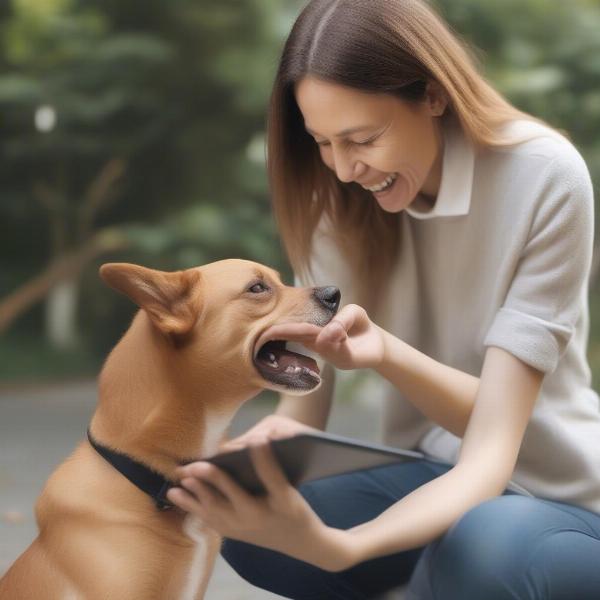Tapeworm dog tablets are essential for protecting your furry friend from the harmful effects of tapeworm infestations. These parasites can cause a range of health problems, from mild discomfort to serious complications. Choosing the right tapeworm dog tablets and understanding how to administer them is crucial for maintaining your dog’s health and well-being. This comprehensive guide will equip you with the knowledge to effectively combat tapeworms in your canine companion.
Understanding Tapeworms in Dogs
Tapeworms are intestinal parasites that attach to your dog’s intestinal wall and absorb nutrients from their food. Infections occur when dogs ingest infected fleas or consume prey animals like rodents that carry tapeworm larvae. Common signs of tapeworm infestation include visible segments resembling grains of rice around the anus, anal itching, and weight loss despite a normal appetite.
Choosing the Right Tapeworm Dog Tablets
Several effective tapeworm dog tablets are available, each containing different active ingredients. Common options include praziquantel, which is found in droncit dog tablets, and epsiprantel. Your veterinarian can help you choose the most appropriate medication based on your dog’s age, weight, breed, and health status. They can also guide you on the correct dosage and administration. Choosing a top rated dog dewormer is essential for successful treatment.
Administering Tapeworm Dog Tablets
Most tapeworm dog tablets can be administered directly by mouth or crushed and mixed with your dog’s food. Follow your veterinarian’s instructions carefully regarding dosage and frequency. Some dogs may experience mild side effects such as vomiting or diarrhea after taking the medication. If these symptoms persist or worsen, consult your veterinarian immediately.
 Dog taking a tablet
Dog taking a tablet
Preventing Tapeworm Infections
Regular deworming is crucial for preventing tapeworm infestations. Your veterinarian can recommend a suitable wormer and flea treatment for dogs schedule based on your dog’s lifestyle and risk factors. Flea control is essential because fleas are intermediate hosts for tapeworms. Regularly treating your dog with a flea preventative and keeping your environment clean can significantly reduce the risk of tapeworm infection.
How often should I deworm my dog for tapeworms?
Veterinarians typically recommend deworming for tapeworms every three to six months, depending on your dog’s lifestyle and risk factors.
Can humans get tapeworms from dogs?
While rare, humans can contract tapeworms from dogs if they accidentally ingest infected flea dirt. Practicing good hygiene, such as handwashing after handling your dog, can help prevent transmission.
What are the signs my dog has tapeworms?
Common signs include visible tapeworm segments around the anus, anal itching, and sometimes weight loss despite a normal appetite.
“Regular flea control is paramount in preventing tapeworms,” says Dr. Emily Carter, DVM, ” as fleas are the primary source of infection for dogs.”
“Always consult your veterinarian for the appropriate tapeworm treatment and dosage,” adds Dr. David Lee, BVSc, ” as different medications may be required depending on your dog’s specific needs.”
Conclusion
Tapeworm infections can be easily treated with the right tapeworm dog tablets and preventative measures. By understanding the lifecycle of tapeworms and implementing effective flea control, you can keep your furry friend healthy and parasite-free. Consult your veterinarian for the best course of treatment and panacur dosage for dogs if you suspect your dog has tapeworms. Using appropriate deworming tablets for dogs and maintaining good hygiene practices are key to keeping your dog safe and healthy.
ILM Dog is a leading international dog website dedicated to providing expert advice on dog care and breeding. We cover a wide range of topics, from breed selection and health care to training, nutrition, grooming, and product recommendations. Whether you’re a first-time dog owner or a seasoned expert, ILM Dog is your trusted source for all things dog-related. For any inquiries, please contact us via email at [email protected] or phone at +44 20-3965-8624. We’re here to help you provide the best possible care for your canine companion.